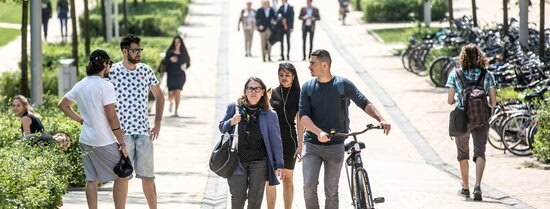Adolescents are often seen as risk seekers who mainly focus on their own needs. Research by PhD student Suzanne van de Groep of Erasmus School of Social and Behavioural Sciences paints a very different picture. Her dissertation shows that young people hand out easily. Young people even give to strangers, even in situations where this does not benefit the giver. The research also provides insight into the brain areas that are involved in giving behaviour.
Puberty is accompanied by major changes. Not only is the brain still developing, but hormones also cause major changes in the body and behaviour of young people. Young people are also busy searching for their own identity, which can be accompanied by a certain amount of uncertainty. This leads to the stigma that young people are mainly concerned with themselves. Van de Groep: "Our society often has a negative image of young people. They are said to be egocentric risk seekers. My dissertation shows that this image is not justified: young people are actually very generous.”
Giving behaviour changes as you get older
A striking finding is that adolescents, as they grow older, make their giving behaviour more dependent on the context and external factors. For example, older adolescents are more likely to give to friends than to strangers. It was also found that young people are more generous when their peers are watching. In order to map this giving behaviour, the PhD student had 520 adolescents play the 'dictator game', a widely used research method in social psychology and economics. The participants had to divide ten coins between themselves and others and were assigned, different recipients.
"Young people gave even more to doctors and people affected by corona than they did to their friends"
Giving behaviour and corona
The dissertation shows that during the corona pandemic, young people were extra generous towards people who were hit hard by the disease, or who work in the frontline of healthcare. On average, young people gave away more than half of their coins to doctors, corona patients or people with a weakened immune system. "During the pandemic, it was often said that young people were not interested in the corona crisis, but their generosity shows that they had a good understanding of what was happening in society and that this mattered to them. Young people gave even more to doctors and people affected by corona than they did to their friends, and we know that friends are extremely important during the teenage years. I should add that I measured this during the first lockdown. I can imagine that after multiple lockdowns and school closures, the results will be different."
Giving behaviour in the brain
While playing the dictator game with friends and strangers, an MRI scan of the participants was made to gain insight into the brain areas involved in giving behaviour. Areas important for behavioural control, emotion processing, and social information processing showed marked activation. Older adolescents showed more activation in the control areas of the brain for non-giving behaviour than younger adolescents. An observation that suggests that the control areas of the brain may play a role in matching giving behaviour to the context.
Training in perspective taking
Another finding of the study is that giving behaviour depends not only on the recipient, but also on the giver's empathy. "Young people who were good at taking the perspective of others turned out to be more generous towards strangers. Their level of perspective-taking did not affect their generosity towards friends. This suggests that training perspective-taking might help reduce in-group bias, or a preference for one's own group over outsiders."
Promoting pro-social behaviour
According to the researcher, the findings are valuable for developing successful interventions to promote pro-social behaviour: these are more likely to focus on unique forms of pro-social behaviour, such as giving, cooperating or helping, rather than on pro-social behaviour in general, as is currently common. "There are already teaching modules to combat bullying. You could also develop training programmes that teach you to adopt the other person's perspective. Taking on the perspective of the other, for example, someone with a migrant background, leads to more understanding and I think we can live together better that way."
Promotion
Suzanne van de Groep defends her dissertation 'Growing in Generosity? Unraveling the effects of benefactor-, beneficiary-, and situational characteristics on the development of giving and it's neural correlates in adolescence' at Erasmus School of Social and Behavioural Sciences.

Promoting pro-social behaviour
According to the researcher, the findings are valuable for developing successful interventions to promote pro-social behaviour: these are more likely to focus on unique forms of pro-social behaviour, such as giving, cooperating or helping, rather than on pro-social behaviour in general, as is currently common. "There are already teaching modules to combat bullying. You could also develop training programmes that teach you to adopt the other person's perspective. Taking on the perspective of the other, for example, someone with a migrant background, leads to more understanding and I think we can live together better that way."
Promotion
Suzanne van de Groep defends her dissertation 'Growing in Generosity? Unraveling the effects of benefactor-, beneficiary-, and situational characteristics on the development of giving and it's neural correlates in adolescence' at Erasmus School of Social and Behavioural Sciences.
- PhD student
- Related content

